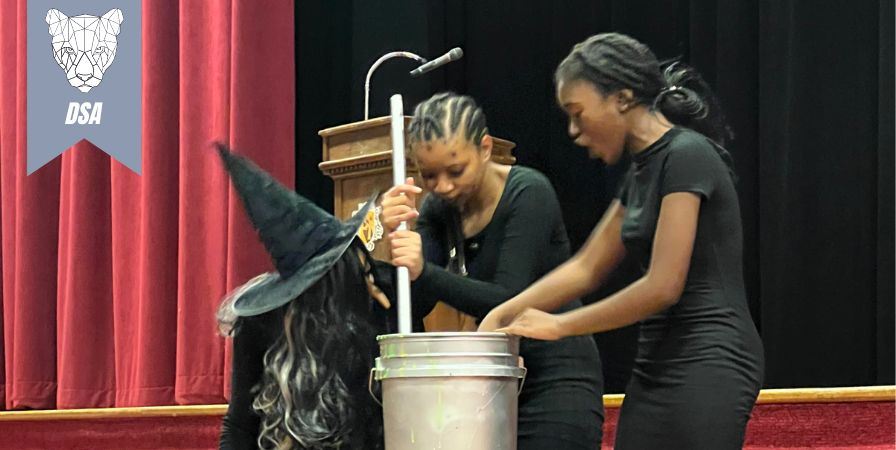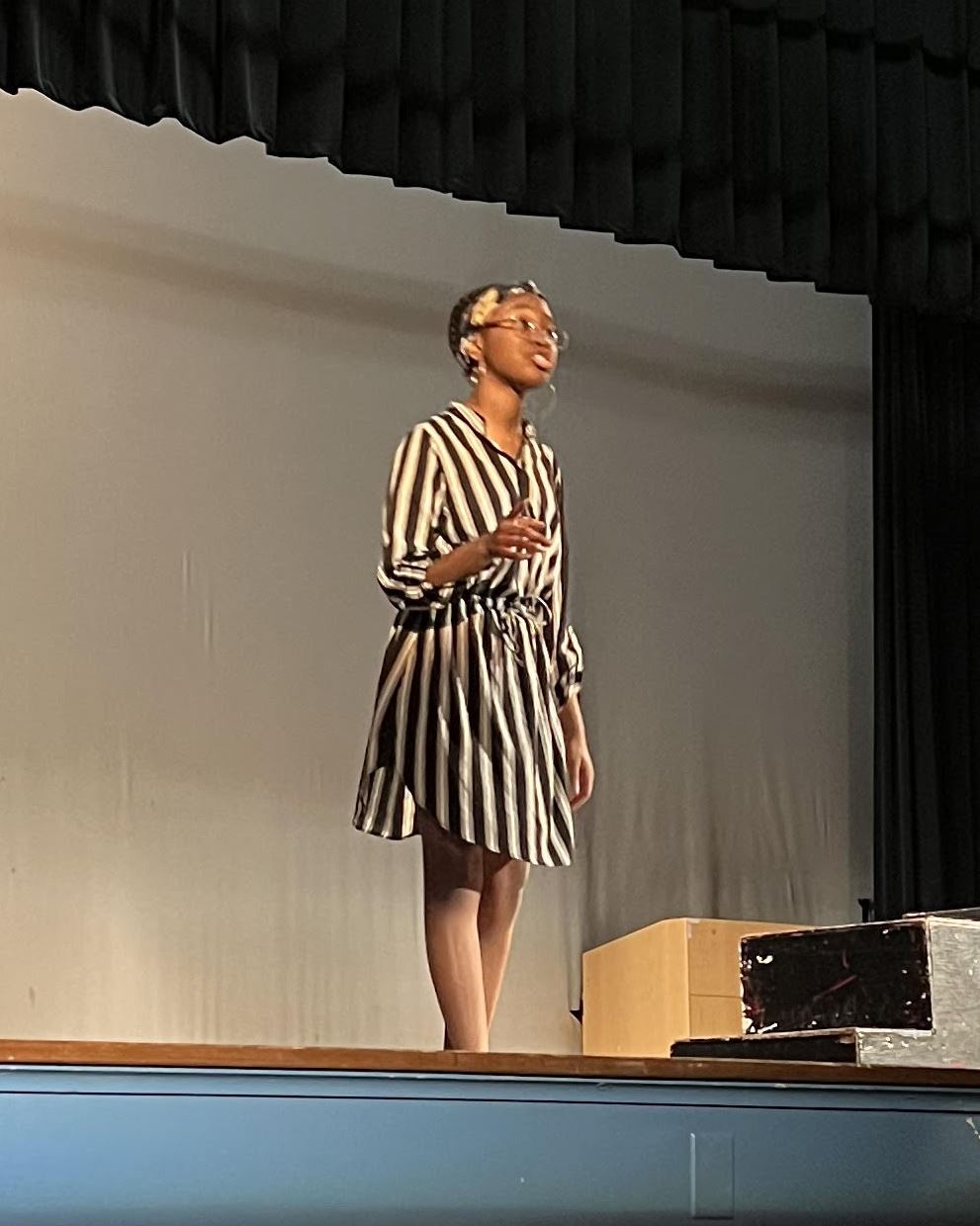- Dike School of the Arts
- Drama
-
Drama Classes at DSA:
- PreK-3rd Grade
- 4th-5th Grade Minor
- 6th-8th Grade Major

-
PreK - 3rd Grade Drama Learning Standards
Drama/Theater Learning Standards for Kindergarten - 3rd Grade
Kindergarten:
- Creating: Students will develop observation and listening skills in a theatrical context and imitate characters from stories and fairy tales.
- Performing: They will engage in dramatic play by imitating movements, voices, and feelings of characters, and work cooperatively to dramatize stories using costumes and props.
- Responding: Students will use basic theater vocabulary, describe the role of a playwright, and distinguish between real and imagined worlds.
- Connecting: They will share thoughts and ideas in response to dramatic experiences and explore concepts from other academic areas through drama.
1st Grade:
- Creating: Students will identify the beginning, middle, and end of stories and use their body and voice to imitate characters from various media.
- Performing: They will work cooperatively to dramatize stories, create personal stories, and perform various roles.
- Responding: Students will use appropriate theater vocabulary to describe experiences, react to character actions, and compare story elements.
- Connecting: They will explain emotional responses to dramatic works and identify similarities and differences in stories from their community.
2nd Grade:
- Creating: Students will identify and summarize plot elements and create expressive voices and movements for characters.
- Performing: They will create character movements and voices, explore scene design, and convey familiar stories.
- Responding: Students will use theater vocabulary, describe character responses to challenges, and critique performances.
- Connecting: They will compare characters to real people, recognize varied cultural perspectives, and integrate information from other academic areas through theater.
3rd Grade:
- Creating: Students will express a character’s thoughts and feelings within a story and create character movements and voices to solve problems.
- Performing: They will use voice, movement, and physical objects to communicate storylines and work collaboratively on dramatic tasks.
- Responding: Students will describe visual, aural, and kinetic elements of plays, discuss playwright choices, and explain their own creative choices in performances.
- Connecting: They will identify factors influencing opinions about dramatic works, explain how settings affect characterization, and use problem-solving skills to interpret stories.
-
4th & 5th Grade Drama Minor Course Description
Course Title: Drama (Minor)
Grade Level(s): 4th-5th
Instructor: Drew PopeCourse Description: Students in grades 4 and 5 will participate in a semester-long Drama course that meets daily. This course explores various styles of Drama, plays, and acting techniques, providing a foundational understanding of the theatrical arts.
Enduring Understandings:
- Creating: Students will identify different character types and their relationships, exploring their thoughts, feelings, and backgrounds.
- Performing: Training will be provided for performing in front of live audiences, creating original scenes and monologues.
- Responding: Students will learn to explain how cultural and physical settings impact characterization in dramatic works.
- Connecting: The course will help students connect dramatic arts with other disciplines, people, and events in the world around them.
Resources for Arts Curriculum Development:
Quarterly Performance Goals and Assessments:
Quarter 1:
- Goals: Connect events in a story to sustain a storyline and achieve resolution. Explain how characters reflect time periods and cultures using dramatic vocabulary. Investigate the cultural significance of drama and theater.
- Assessments: Students will create scenes, characters, and monologues. Performances will be held three times throughout the year. Constructive peer feedback will be a key component.
Quarter 2:
- Goals: Develop character movement and voice, manipulate dramatic elements, create improvisations, direct peers, and write scripts.
- Assessments: Scene presentations will be done in partners and groups. Continued emphasis on creating scenes, performing, and providing feedback.
Quarter 3:
- Goals: Discuss character consequences, compare theatrical styles, reflect cultural perspectives, and use dramatic vocabulary accurately.
- Assessments: Assessments will focus on voice, blocking, character, and collaboration. Performance projects will continue as in previous quarters.
Quarter 4:
- Goals: Analyze conflicts and emotions in dramatic works, investigate historical elements of theater, compare performance styles, and explore theater careers.
- Assessments: Students will create and perform scenes, with a focus on understanding the collaborative nature of theater.
Grading Policy: Students can earn up to 3 PBIS points daily for good behavior. Grades will be based on participation in class scenes, presentations, performances, and readiness (having required materials).
Classroom Culture: A supportive environment where students collaborate on projects, participate in discussions, and provide constructive feedback. PBIS points are awarded for being Respectful, Responsible, Safe, and Engaged.
Classroom Routines & Procedures: Daily warm-ups include stretching, tongue twisters, breathing exercises, and theater games. Students will take notes on theater sections and vocabulary.
Behavioral Expectations: Students are expected to create a safe space, understand the full art form of theater, perform in-class and on-stage, respect the theater, and show self-discipline. All students must participate in the Winter show.
-
6th - 8th Grade Drama Major Course Description
Course Title: Drama (Major)
Grade Level(s): 6th-8th
Instructor: Drew PopeCourse Description: Students in grades 6 through 8 will engage in a comprehensive, year-long Drama course that meets daily. This course explores various styles of Drama, plays, and acting techniques, providing an in-depth understanding of the theatrical arts.
Enduring Understandings:
- Creating: Students will identify different character types and their relationships, exploring their thoughts, feelings, and backgrounds.
- Performing: Training will be provided for performing in front of live audiences, creating original scenes and monologues.
- Responding: Students will learn to explain how cultural and physical settings impact characterization in dramatic works.
- Connecting: The course will help students connect dramatic arts with other disciplines, people, and events in the world around them.
Resources for Arts Curriculum Development:
Quarterly Performance Goals and Assessments:
Quarter 1:
- Goals: Create and perform improvisations and scripted scenes based on personal experiences. Construct scenes with developed characters and alternate endings. Integrate dance, visual art, or music into performances.
- Assessments: Students will create scenes, characters, and monologues. Performances will be held three times throughout the year. Constructive peer feedback will be a key component.
Quarter 2:
- Goals: Develop character movement and voice, manipulate dramatic elements, create improvisations, direct peers, and write scripts.
- Assessments: Scene presentations will be done in partners and groups. Continued emphasis on creating scenes, performing, and providing feedback.
Quarter 3:
- Goals: Discuss character consequences, compare theatrical styles, reflect cultural perspectives, and use dramatic vocabulary accurately.
- Assessments: Assessments will focus on voice, blocking, character, and collaboration. Performance projects will continue as in previous quarters.
Quarter 4:
- Goals: Analyze conflicts and emotions in dramatic works, investigate historical elements of theater, compare performance styles, and explore theater careers.
- Assessments: Students will create and perform scenes, with a focus on understanding the collaborative nature of theater.
Grading Policy: Students can earn up to 3 PBIS points daily for good behavior. Grades will be based on participation in class scenes, presentations, performances, and readiness (having required materials).
Classroom Culture: A supportive environment where students collaborate on projects, participate in discussions, and provide constructive feedback. PBIS points are awarded for being Respectful, Responsible, Safe, and Engaged.
Classroom Routines & Procedures: Daily warm-ups include stretching, tongue twisters, breathing exercises, and theater games. Students will take notes on theater sections and vocabulary.
Behavioral Expectations: Students are expected to create a safe space, understand the full art form of theater, perform in-class and on-stage, respect the theater, and show self-discipline. All students must participate in the Winter and Spring shows.



